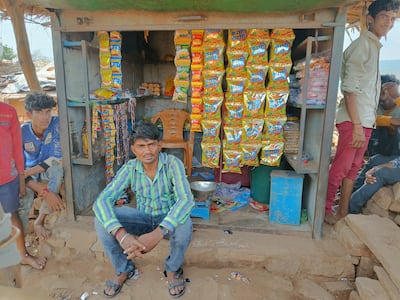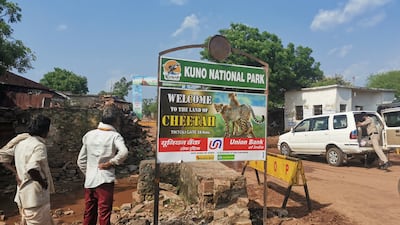Along the winding motorway that cuts through the lush hills and highlands of the Vindyas mountain range in India's central Madhya Pradesh state, two things stand out – stray cows on the road and billboards that show Prime Minister Narendra Modi and cheetahs.
On Saturday, Mr Modi released eight cheetahs from Namibia into the wild, the launch of a reintroduction programme seven decades after the big cats were declared extinct in India.
The cheetahs — five females and three males — were released into a quarantine enclosure at the Kuno National Park in a grand ceremony that coincided with the Mr Modi's 72nd birthday.






The project has created a wave of excitement among residents of this largely underdeveloped tribal region in central India.
At Tiktoli, a village near the national park, residents are hopeful that the exotic arrivals become a tourist attraction that brings jobs and development.
The roughly 200 households in the village lack basic facilities such as running water, electricity and mobile phone connectivity.
The thatched stone houses are dilapidated, the roads through the village are broken, and schools double as cattle sheds and offices for village councillors.

“More tourists will come to see cheetahs, which means more money. I am expecting to make sales of 1,000 rupees [about $12.50] a day,” said Jagdish Kumar Khadiyar, 33, the owner of a shop who said he currently makes half that amount.
Aibaran Manai, 27 is unemployed and equally optimistic.
“I took a driving class this January. I have been jobless for a while, but the cheetahs will bring tourists for safaris. I am expecting to get a driving job for safari jeeps,” he told The National.
The reintroduction of cheetahs has also received support from wildlife enthusiasts and experts who believe the programme will play a significant role in diversifying the area's ecology.
They hope India’s successful efforts to save its tiger population and protect its Asiatic lions ― species that have been brought back from the brink of extinction in just over two decades – will be a template for returning cheetahs to the Indian landscape.
"We want the cheetahs back in the country to bring back focus on ecological restoration and save parts of the biodiversity, just like we did with tigers,” Dr MK Ranjitsihn, a leading member of the government’s cheetah project, told The National.
India's population of Asiatic cheetahs, estimated to have once numbered 10,000, was lost to hunting and depleted habitation. The last three were killed by a royal hunting party in 1947, and the government declared the species extinct five years later.
Cheetahs are on the red list of threatened species worldwide, at risk from climate change, loss of habitat and low reproduction rates. Only about 7,000 of the animals remain in the wild, mainly in the grasslands of South Africa, Namibia and Botswana.









Fragile species
Indian authorities plan to bring in 50 cheetahs from Namibia over the next five years, while more from South Africa are expected to begin arriving in coming months.
A 500-hectare enclosure was built at the Kuno National Park, where the animals will be kept while they adapt to their new environment. Scientists will track their movements and monitor their health status with satellite collars.
“The habitat in Kuno has been seen by the world’s greatest cheetah experts and certified as a suitable habitat with adequate prey," Mr Ranjitsihn said.
“The cheetah's initial reintroduction will be treated as part of the metapopulation that may be established in India."
But some conservationists said the project is an unsustainable and aimed at increasing tourist revenue rather than reintroducing cheetahs.
Ullas Karanth, a conservation zoologist and emeritus director of the non-profit Centre for Wildlife Studies in Bengaluru, said he fears that the cheetahs will start “perishing” once they are released.
He said they are a fragile species and will lose out in conflict with local animals.
“The Kuno effort is a vanity project for PR purposes. Cheetahs in India are a valid project, but the present project cannot achieve that goal for both ecological and social reasons,” Mr Karanth told The National.
He said Kuno was not big enough to accommodate the animals, as a single cheetah requires up to 1,500 square kilometres as its territory.
“Kuno Park is less than 4,000 square kilometres in area which is populated by leopards, surrounded by dense populations of humans, livestock and feral dogs. A naturally sustainable cheetah population will require 10,000 square kilometres or more with abundant wild prey.”
“The enclosures now built are just a larger version of a zoo, not a rewilding population of cheetahs,” he said.









